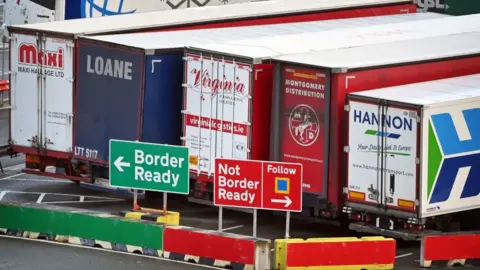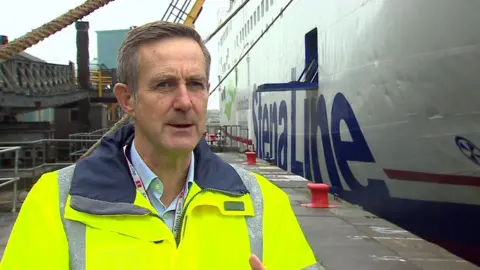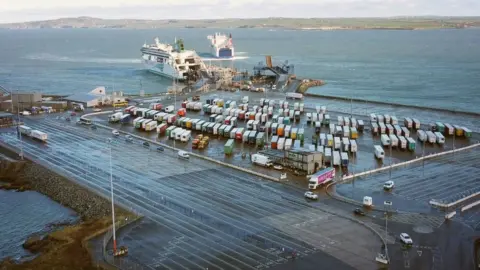Welsh ports had 30% less traffic due to Brexit - shipping chief
 AFP
AFPHolyhead and Fishguard ports saw a 30% drop in traffic in 2021, according to its operator Stena Line.
Ian Davies, boss of Stena's UK ports, said it was down to the new post-Brexit trading relationship with the European Union rather than the pandemic.
But he added the company had a "long-term" commitment to its Welsh ports and expected things to improve.
The UK government said it had made "extensive preparations" and continued to work to mitigate disruption.
After years of negotiations, the UK completed its formal separation from the EU on 1 January 2021.
Speaking to the BBC Politics Wales programme, Mr Davies said the start of the new UK-EU trading relationship hit its Welsh ports "quite hard".
"In January, we saw a big drop off ranging from 50-60% of our freight volumes," he said.
"As people really kind of got used to the new regimes and the new documentation that was required, I would say it caught quite a few, not so much in the haulage industry but their customers, unaware.
"But then things gradually improved, but we seem to have plateaued; currently, we're probably in the region of 30% down on our [pre-pandemic] 2019 volume."
'Post-Brexit effect'

Asked if it was possible to decouple the pandemic hit from a change in post-Brexit trading patterns, Mr Davies said: "I think now we're probably in a position to say yes, this is really the effect post-Brexit of where we are and slight changes in the way that people are moving freight.
"If we look at the Irish Sea in its entirety, the freight volumes are roughly the same.
"What has been adversely affected is really the Welsh ports and the Welsh routes so far."
But he was optimistic about the future, saying he thought "things will improve".
In October, Ireland's foreign affairs minister said there had been a big increase in ferry routes avoiding Welsh ports by directly linking Ireland to mainland Europe - up from "less than a dozen" to 44 direct routes.
Simon Coveney told BBC Radio Wales' Sunday Supplement programme at the time the use of a so-called land-bridge from Holyhead to Dover had been a vital part of supply chains in and out of Ireland.
Land-bridge movements refer to lorries from Ireland crossing Wales and England en route to other EU countries.
Direct sea routes from Ireland to France are slower and more expensive than crossing the Irish Sea and driving south through Wales and England to cross the Channel between Dover and Calais.
But sailing directly avoids the new post-Brexit checks and paperwork.
Dublin Port's boss said this week Brexit spelled the end of the British land-bridge transit route.
Mr Davies said: "If you look at the numbers you see, statistically, percentage wise, there is a huge increase.
"But you have to remember the market is very small before. The biggest trading partner is still the UK."
'Long-term player'
Wales currently has three ports that have direct routes to Ireland - Holyhead and Fishguard, which are run by Stena Line, and Pembroke.
Asked if he believed those three could be sustained, Mr Davies said Stena Line was "a long-term player".
"Business goes through cycles. We saw it in 2007 and 2008 when the Celtic Tiger [Ireland] crashed," he said.
"We never thought we would see recovery. It took three or four years. We got there. We see this as another business cycle."
Not all the required checks on EU imports to the UK have been introduced with many more scheduled during 2022.
 AFP
AFPChecks on some animal and plant-based goods are set to be undertaken in so-called Border Control Posts (BCP) from 1 July 2022.
The Welsh government has plans to build one BCP outside Holyhead and one in south Wales to service both Fishguard and Pembroke ports.
But neither will be ready on 1 July, leading Wales' Economy Minister Vaughan Gething to announce that the Welsh government is "exploring interim arrangements at Welsh ferry ports to bridge the gap".
The leader of the Welsh Liberal Democrats, Jane Dodds, accused the UK government of doing "half a job" of the Brexit deal.
"Whether it's the unacceptable levels of new red tape for our hauliers and small businesses, the lack of an adequate veterinary agreement for our farmers, or the impact of lost development funds on our most deprived regions, the Conservatives are failing to even attempt to address the problems they have caused on multiple fronts," she added.
A UK government spokesperson said: "We have made extensive preparations and continue to work closely with port authorities, devolved administrations and other partners to deliver the systems and infrastructure needed on time."
Asked about the delay, Mr Davies said: "They have interim measures that they are putting in place so they meet their criteria, so that doesn't really affect us but what we would like is clarity going forward.
"But, we also know the UK government are talking about in 2025 a digital border.
"So, the question is why are we going through all this investment in physical infrastructure when in 2025 we have a digital border potentially coming?"
You can watch the interview in full on BBC Politics Wales iPlayer.
